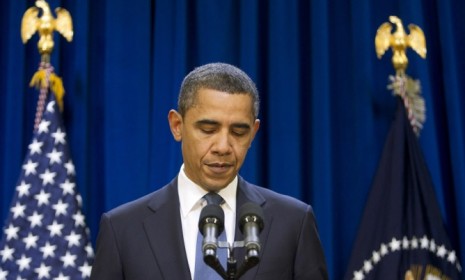Is Obama's federal pay freeze a 'gimmick'?
The president wants to freeze civilian federal employees' salaries for two years. Will this make a dent in the deficit — or is it just an empty gesture?

A free daily email with the biggest news stories of the day – and the best features from TheWeek.com
You are now subscribed
Your newsletter sign-up was successful
President Obama has proposed an across-the-board, two-year pay freeze for all civilian federal employees — a strategy the White House says will save about $5 billion over two years and $28 billion over five years. The plan requires approval by Congress, where an empowered Republican caucus has prioritized government spending cuts. But even if the plan is enacted, the savings are a tiny fraction of our $1.3 trillion deficit. Is this, as Obama says, the first of many hard budget choices, or is it mostly political theater? (Watch Obama's announcement)
Obama's anteing up: This "largely symbolic" budget-cutting gesture will take only "a relatively small nibble" out of the deficit, says Adam Sorenson in Time. But it's significant that Obama made the announcement the day before he faces off with congressional Republicans, who want bigger slices from the federal bureaucracy. Obama is gambling he can "co-opt" the populist anger over federal pay "without giving away the farm."
"Potential pitfalls in Obama's federal pay freeze"
The Week
Escape your echo chamber. Get the facts behind the news, plus analysis from multiple perspectives.

Sign up for The Week's Free Newsletters
From our morning news briefing to a weekly Good News Newsletter, get the best of The Week delivered directly to your inbox.
From our morning news briefing to a weekly Good News Newsletter, get the best of The Week delivered directly to your inbox.
This won't satisfy anyone: Obama's "pay freeze gimmick" won't win him any political points, says Jonathan Chait in The New Republic. Liberals will "dismiss it because it's a stupid policy, and conservatives [will] attack it because they're partisan Republicans," and because it doesn't cut deep enough. That leaves Obama with "a policy initiative that's mildly harmful and panned by all sides."
"The federal pay freeze gimmick"
The symbolism is the point: "Bashing" federal workers as overpaid and underworked is "neither fair nor accurate," but freezing their pay "at a time of low inflation is a fair step," says The Washington Post in an editorial. The "symbolic effect" of having the federal government participate in this era of "shared sacrifice" is as important as the "relatively small, but not trivial" dent it will make in our budget deficit.
A free daily email with the biggest news stories of the day – and the best features from TheWeek.com
-
 Political cartoons for February 16
Political cartoons for February 16Cartoons Monday’s political cartoons include President's Day, a valentine from the Epstein files, and more
-
 Regent Hong Kong: a tranquil haven with a prime waterfront spot
Regent Hong Kong: a tranquil haven with a prime waterfront spotThe Week Recommends The trendy hotel recently underwent an extensive two-year revamp
-
 The problem with diagnosing profound autism
The problem with diagnosing profound autismThe Explainer Experts are reconsidering the idea of autism as a spectrum, which could impact diagnoses and policy making for the condition
-
 The billionaires’ wealth tax: a catastrophe for California?
The billionaires’ wealth tax: a catastrophe for California?Talking Point Peter Thiel and Larry Page preparing to change state residency
-
 Bari Weiss’ ‘60 Minutes’ scandal is about more than one report
Bari Weiss’ ‘60 Minutes’ scandal is about more than one reportIN THE SPOTLIGHT By blocking an approved segment on a controversial prison holding US deportees in El Salvador, the editor-in-chief of CBS News has become the main story
-
 Has Zohran Mamdani shown the Democrats how to win again?
Has Zohran Mamdani shown the Democrats how to win again?Today’s Big Question New York City mayoral election touted as victory for left-wing populists but moderate centrist wins elsewhere present more complex path for Democratic Party
-
 Millions turn out for anti-Trump ‘No Kings’ rallies
Millions turn out for anti-Trump ‘No Kings’ ralliesSpeed Read An estimated 7 million people participated, 2 million more than at the first ‘No Kings’ protest in June
-
 Ghislaine Maxwell: angling for a Trump pardon
Ghislaine Maxwell: angling for a Trump pardonTalking Point Convicted sex trafficker's testimony could shed new light on president's links to Jeffrey Epstein
-
 The last words and final moments of 40 presidents
The last words and final moments of 40 presidentsThe Explainer Some are eloquent quotes worthy of the holders of the highest office in the nation, and others... aren't
-
 The JFK files: the truth at last?
The JFK files: the truth at last?In The Spotlight More than 64,000 previously classified documents relating the 1963 assassination of John F. Kennedy have been released by the Trump administration
-
 'Seriously, not literally': how should the world take Donald Trump?
'Seriously, not literally': how should the world take Donald Trump?Today's big question White House rhetoric and reality look likely to become increasingly blurred